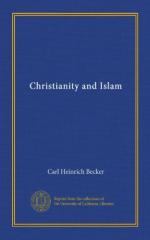A world-religion, such as Christianity, is a highly complex structure and the evolution of such a system of belief is best understood by examining a religion to which we have not been bound by a thousand ties from the earliest days of our lives. If we take an alien religion as our subject of investigation, we shall not shrink from the consequences of the historical method: whereas, when we criticise Christianity, we are often unable to see the falsity of the pre-suppositions which we necessarily bring to the task of inquiry: our minds follow the doctrines of Christianity, even as our bodies perform their functions—in complete unconsciousness. At the same time we possess a very considerable knowledge of the development of Christianity, and this we owe largely to the help of analogy. Especially instructive is the comparison between Christianity and Buddhism. No less interesting are the discoveries to be attained by an inquiry into the development of Muhammedanism: here we can see the growth of tradition proceeding in the full light of historical criticism. We see the plain man, Muhammed, expressly declaring in the Qoran that he cannot perform miracles, yet gradually becoming a miracle worker and indeed the greatest of his class: he professes to be nothing more than a mortal man: he becomes the chief mediator between man and God. The scanty memorials of the man become voluminous biographies of the saint and increase from generation to generation.
Yet more remarkable is the fact that his utterances, his logia, if we may use the term, some few of which are certainly genuine, increase from year to year and form a large collection which is critically sifted and expounded. The aspirations of mankind attribute to him such words of the New Testament and of Greek philosophers as were especially popular or seemed worthy of Muhammed; the teaching also of the new ecclesiastical schools was invariably expressed in the form of proverbial utterances attributed to Muhammed, and these are now without exception regarded as authentic by the modern Moslem. In this way opinions often contradictory are covered by Muhummed’s authority.
The traditions concerning Jesus offer an analogy. Our Gospels, for instance, relate the beautiful story of the plucking of the ears of corn on the Sabbath, with its famous moral application, “The Sabbath was made for man, and not man for the Sabbath.” A Christian papyrus has been discovered which represents Jesus as explaining the sanctity of the Sabbath from the Judaeo-Christian point of view. “If ye keep not the Sabbath holy, ye shall not see the Father,” is the statement in an uncanonical Gospel. In early Christian literature, contradictory sayings of Jesus are also to be found. Doubtless here, as in Muhammedan tradition, the problem originally was, what is to be my action in this or that question of practical life: answer is given in accordance with the religious attitude of the inquirer and Jesus and Muhammed are made to lend their authority to the teaching. Traditional literary form is then regarded as historical by later believers.




